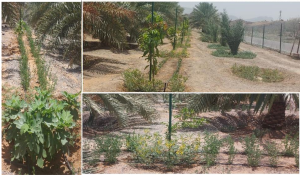
Adopting Permaculture Technique under Forest and Date Palm Overstory: A Promise for Greening the Fujairah Mountains
Permaculture is an ecological design and approach mimicking the nature to create sustainable agricultural ecosystem. Permacultures assemble the concept, material, and strategic of regenerative agriculture and natural ecosystems to grow a wide variety of native forest, fruit trees, shrubs, vegetables, perennial legumes and annual herbs with relatively little water, relying on the layering shading systems, soil amendments, and micro water harvesting techniques. It emphasizes working with natural systems rather than against them, focusing on biodiversity, soil health, and resource conservation. By creating ecosystems that are rich in diversity and balance, permaculture offers long-term solutions to food production and land restoration, making it particularly suitable for areas like the Fujairah Mountains. One of the critical challenges in Fujairah environments is poor soil quality and the risk of erosion. Native trees in the Fujairah Mountains play a crucial role in stabilizing soil with their extensive root systems, preventing it from washing away during heavy rains or blowing off in strong winds. Well-designed permaculture system with Multi-layered root system to stabilize soil can prevent soil erosion, and multi-layered canopy system using diversity of plant species to prevents soil drying out and ensure high soil microorganisms’ activities.
One effective permaculture technique that holds a promise for developing Fujairah Forestation ecosystem is intercropping strategy. Intercropping is an ancient agricultural strategy where two or more plant species are grown simultaneously in the same field, such as planting native perennial legumes with cereals or grasses such as panicum, or annual finger millet under forest or date palm overstory. legume based intercropping system increase soil fertility by fixing atmospheric nitrogen in soil and transforming it from inorganic to organic form, promoting biological activities (enzymatic), crop yields, and land biodiversity, which reduce dependence on synthetic fertilizers and increases the resilience of agricultural systems to climate change. Legumes genetically have deeper root systems than cereals and grasses, allowing them to access water from different soil depths. This complementary root structure helps the plants share water resources more efficiently, making the system more resilient to drought. The diverse growing of native grasses and legumes species in the ecosystem creates ground cover that reduces invasive species competition and that will also disrupt the pest populations.
Date palms (Phoenix dactylifera) are perfectly adapted to the Fujairah environment, excellent anchor for desert permaculture. The most significant advantage of using date palms overstory in permaculture is the creation of a microclimate because both provides enough space for intercropping with fruit trees, perennial and annual crops, also create a protective overstory, a canopy that offers shade for beneath plants which reduces the temperature and evapotranspiration rates, creating a cooler, more humid microclimate. This strategy will enable the cultivation of more sensitive plants, including legumes, vegetables, herbs, and fruit trees, that would otherwise struggle to survive in Fujairah’s intense heat.
Native forest trees act as a natural windbreak, protecting more delicate crops and fruit trees from dehydration and harsh desert conditions. while integrating agroforestry practices into the permaculture design under a native forest overstory, crops can be grown while also contributing to ecological restoration. Trees provide shelter, food, and habitat for animals, and the symbiosis between animal, crops, and trees creates a system where each element supports the othersIntegrating fruit trees as mid story layer enhance biodiversity and productivity of whole system. Fruit trees such as pomegranates, figs, guavas, and citrus are well-suited to Fujairah environments and they have deeper root systems than the date palm making a different layers of roots structure that helps sharing water resources more efficiently, furthermore that fruit trees can thrive under the protection of the date palm canopy.
Farmers can benefit from this ecological complexity of this system in improving crop yield and resilience against pests, diseases, and environmental stresses, allowing them to harvest a wider variety of products which create additional revenue for their families in same time improving food security.
Effective water management is a key factor for successful desert permaculture system, irrigation practices must be highly efficient, using innovative irrigation technique such as subsurface irrigation, which delivers water directly to the roots of plants, minimizing evaporation and maximizing water use efficiency. By combining subsurface irrigation with a mulching system, farmers can reduce water loss and overcome of weeding practices.
Implementing various intercropping permaculture projects in in different Fujairah regions will improve the vegetation cover leading to greening of Fujairah Mountain. Establishment permaculture food forest in the contour lines of water flow in high lands and date palms permaculture in lowlands with adopting water management strategies such as micro rainwater harvesting technique, subsurface irrigation methods, and anti-evaporation strategies. all those projects will improve soil fertility, reduce soil erosion, create biodiverse and plant cover that are more resilient to withstand against of extreme temperatures, droughts, and other stresses associated with climate change. Desert permaculture, specifically cereal/native grasses with legume intercropping under date palm and native forest overstory, offers a powerful strategy for creating sustainable and resilient agroecological systems in the area promise for greening of Fujairah mountains. By working with nature rather than against it, this innovative approach helps government and farmers tackle the challenges of arid environments while promoting biodiversity, soil health, and water efficiency. As the UAE government continues to prioritize food security and environmental sustainability, desert permaculture stands as a beacon of hope for the future of agriculture in the revitalization of the region's ecosystem.
